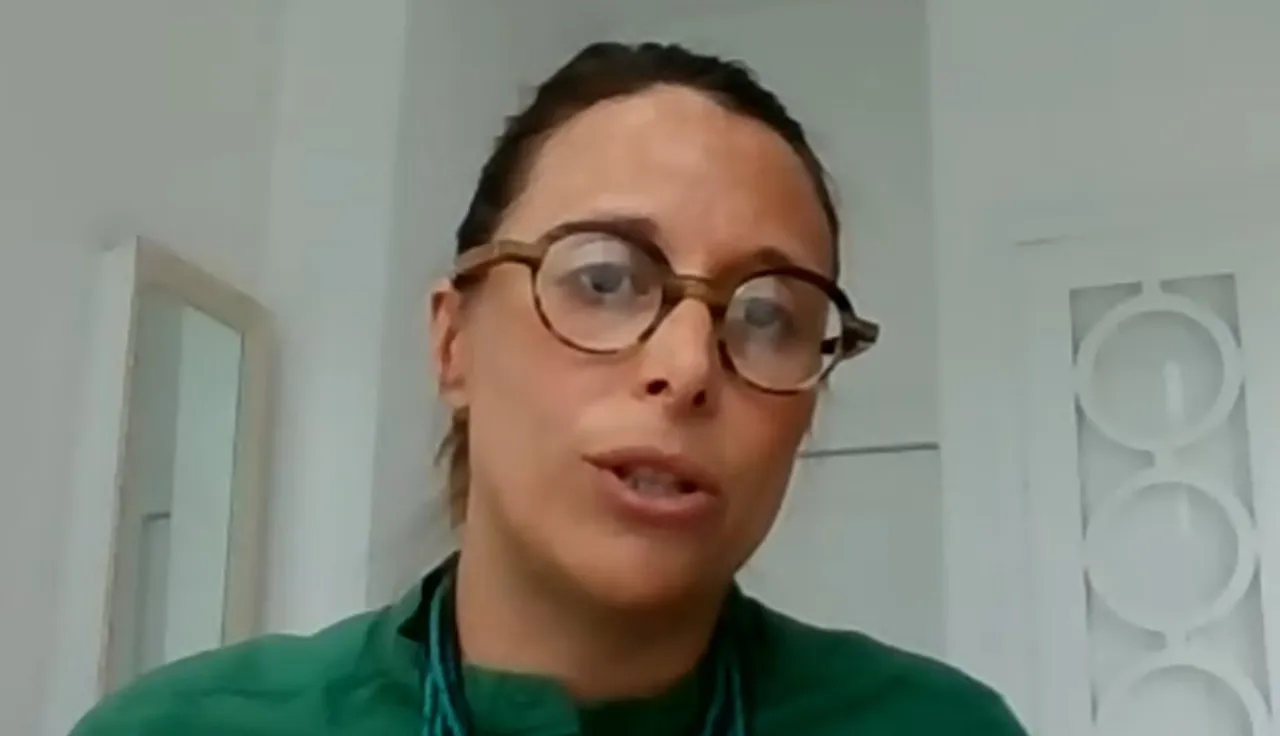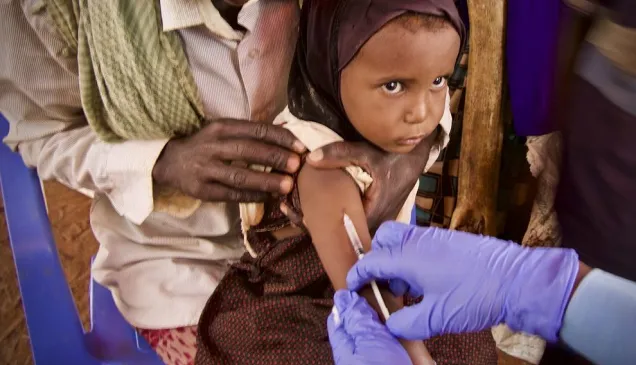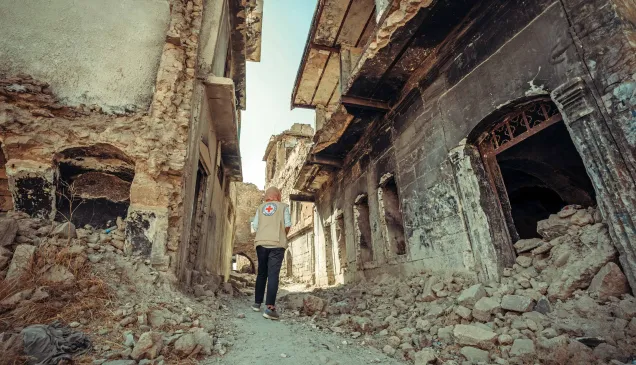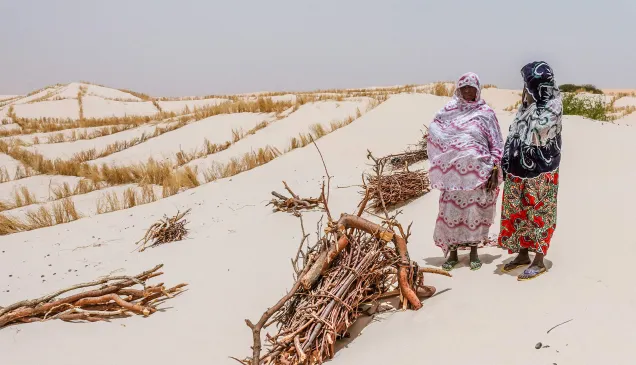As-delivered by Laetitia Courtois, the ICRC's Permanent Observer to the UN and head of delegation, New York
Thank you very much for this opportunity of the ICRC to raise its concern on humanitarian access and specific protection related issues. As you know the ICRC's mandate focuses on conflict and violence affected areas and as such has been looking at very specific protection concerns be it for vulnerable populations such as detainees, displaced people, or people affected directly by the hostilities. But also looking at how to support weakened systems that are often affected directly by the hostilities or years of non-maintenance. In that perspective we are quite used to seeing the impact of some epidemics and pandemics. But it is true that today we are looking at a situation that is very much different in terms of scope and impact.
As President Peter Maurer mentioned yesterday to the Security Council, with this COVID-19 crisis it is becoming a protection crisis and this needs to be understood very clearly in all its aspects and addressed.
I will try to present four protection issues that are of concern to the ICRC: the access to vulnerable populations in conflict affected areas and the dialogue that is necessary with non-state armed groups, the digital threats, as well as the protection of medical workers and facilities.
Starting with the access, when we talk about access restrictions, it is crucial to understand that COVID-19 related restrictions are but an additional factor that impacts access to humanitarians. In many contexts cumulative of armed conflict, insecurity for humanitarians, and those related restrictions can have an impact on how we can respond. I will give you two examples that are very fresh:
In South Sudan: we have intercommunal violence in Jonglei state has recently left hundreds dead and many injured and in need of medical assistance including surgery for the war wounded. During this attack, a South Sudanese Red Cross Volunteer and a staff member of MSF were killed and injured. This came at a time when the ICRC's surgical capacity was reduced by 30 per cent, as beds had to be reduced to put in place physical distancing measures. Rotations of surgeons have also been difficult in those places because of restrictions connected to COVID-19.
Libya is another example where the fighting escalates. the protracted conflict has disrupted electricity, water and health systems as well as other essential services. And with restrictions such as curfews and border closures, we have had enormous challenges to deliver humanitarian aid to keep the supply chains for food, medicine, and basic needs open.
We acknowledge, of course that for States, especially those with weak healthcare systems, need to address this pandemic and put in place restrictions of movement for the protection of their population. At the same time, it is important to see how this has prevented humanitarians, including the ICRC, on moving goods and personnel, especially at the international level. So we need to understand, as well, how exceptional those restrictions will be and how they will be maintained in the new normal until the pandemic can be managed. And this will take months.
On a positive note, of course, we see that the dialogue on protection issues, and with authorities have allowed for exceptions. Yet this is taking a minimal aspect when we consider the overall needs we have in front of us.
Second point I want to raise is protection of most vulnerable groups of population in conflict and violence affected areas and how a dialogue with non-State armed group-controlled areas is more critical than ever. Of course, under international humanitarian law there is an obligation to discuss with all armed actors and also to discuss how those restrictions can be lifted facilitating the movement of people and goods to areas that require urgent humanitarian needs. For us, the dialogue with those armed groups but also the community proximity is key to get a lasting impact on the situation.
Many groups have implemented different types of restrictive measures that range from the imposition of parallel curfews, street patrols to awareness campaigns on COVID-19 and on distribution of aid as well as protective equipment. They have taken also initiatives on quarantine-like measures, but sometimes those also contradict health standards and may be counter-productive. We have engaged with those groups to make sure we understand all the limits of the measures and make sure that those measures are also contributing to the response to the pandemic.
We have also seen that non-state armed groups have unilaterally declared ceasefires, this has allowed the population to access healthcare as well as creating conditions that allow organizations to move more freely without worrying about being caught in the middle of hostilities. For us it is important to continue building on those areas because today when we talk about when the vaccines will be ready we need to think already by tomorrow how those vaccines and those treatment will reach out most vulnerable areas, which is a component of a coherent and comprehensive response to the pandemic.
We are therefore recalling that it is hugely important to facilitate this contact and allow impartial humanitarian actors to engage with those armed groups, even if they are qualified as terrorists or going against some principles.
The third point is the health care in danger related issues. It is important to realize that we have seen new trends in terms of attacks and medical facilities. While on one raise we see a lot of praise and recognition for those workers. There is a lot of stigmatization coming up in some specific contexts. In less than three months we have recorded 208 incidents. We know this number is definitely lower than the reality. And those incidents go from nurses being attacked with products, structures being burned down, to systematic stigmatization as this person is considered as bringing the pandemic. It is important that we react at the same time as we continue denouncing attacks on medical facilities that take place in conflict-affected areas. I think we have all been shocked by the recent event in Afghanistan where maternity ward was targeted leaving women and babies dead.
Last point, but not least, is also something that we raised last week at the Security Council report to digital risks enhanced within the current accelerated digitalization of the world due to the COVID-19 reality. We have seen an increase in reports of malicious cyber operations impacting access and hampering provision of medical services, delaying for instance the processing of tests by several days but also impacting the well-functioning of emergency services dedicated to COVID-19 treatment. When medical services are disrupted, it's obvious that it puts people's lives in danger.
Second, we have seen the fast track virtualization of our working modalities has also increased the risks related to data protection of individual data: as the pandemic asks for more intensified data collection, the problem remains as to how it is collected and how it is being used.
In that sense I will conclude with four asks, the first one is to make sure that Member States and parties to armed conflict respect international humanitarian law. I know it's the law, but it is also important to realize how law generates those positive outcomes when it comes to humanitarian actions.
The second point is to make sure that COVID-19 restrictions do not hamper the movement of humanitarian staff or goods and facilitates the access and delivery of essential services and movements of essential staff between countries. The good practice of granting exceptions is positive and needs to be emulated as much as possible.
The third point is to ask that the ICRC and other impartial humanitarian organizations are allowed to continue working with non-state armed groups. Ensure that counter-terrorism measures and sanctions do not impede the ICRC and other impartial organizations from engaging with armed groups even if they are designated as "terrorists."
And the last one is to protect medical facilities and medical personnel at all times.
Thank you very much.




